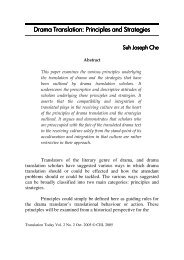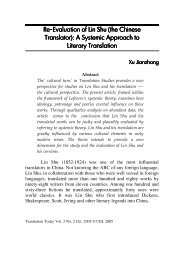Translation and Literary Genres: A Case Study of Poetry in Bengali ...
Translation and Literary Genres: A Case Study of Poetry in Bengali ...
Translation and Literary Genres: A Case Study of Poetry in Bengali ...
Create successful ePaper yourself
Turn your PDF publications into a flip-book with our unique Google optimized e-Paper software.
120 Ch<strong>and</strong>rani Chatterjee <strong>and</strong> Mil<strong>in</strong>d Malshe<br />
It is clear that there is a dist<strong>in</strong>ct possibility <strong>of</strong> break<strong>in</strong>g rules<br />
<strong>and</strong> the desire to experiment with the generic conventions. In fact,<br />
the doctr<strong>in</strong>e <strong>of</strong> the purity <strong>of</strong> genres disappeared with the neoclassical<br />
theorists. Thus, though Derrida beg<strong>in</strong>s his essay ‘The Law<br />
<strong>of</strong> Genre’ by posit<strong>in</strong>g two statements “<strong>Genres</strong> are not to be mixed. I<br />
will not mix genres”, the essay ends on a different note where,<br />
accord<strong>in</strong>g to Derrida, the law <strong>of</strong> contam<strong>in</strong>ation is <strong>in</strong>herent <strong>in</strong> the<br />
generic law. This tendency <strong>of</strong> genres to diffuse <strong>and</strong> to be<br />
contam<strong>in</strong>ated to create what may be called ‘hybrid’ genres is<br />
particularly noticeable <strong>in</strong> generic translations across cultures.<br />
Of the many forms <strong>in</strong>troduced <strong>in</strong>to <strong>Bengali</strong> literature<br />
through the <strong>in</strong>fluence <strong>of</strong> the West, the sonnet has perhaps succeeded<br />
the most. Michael Madhusudan Dutta (1824-1873) was the first to<br />
<strong>in</strong>troduce the sonnet <strong>in</strong>to <strong>Bengali</strong> literature. In Michael Madhusudan<br />
Dutta’s letter number thirty seven, addressed to his friend Raj<br />
Narayan Basu, the poet noted: ‘I want to <strong>in</strong>troduce the sonnet <strong>in</strong>to<br />
our language…if cultivated by men <strong>of</strong> genius; our sonnet would <strong>in</strong><br />
time rival the Italian.’ Madhusudan Dutta published a collection <strong>of</strong><br />
one hundred <strong>and</strong> two sonnets called Chaturdashpadi Kavitavali<br />
(1866), written dur<strong>in</strong>g his stay <strong>in</strong> France. In the second poem <strong>of</strong> the<br />
anthology, the poet relates the brief history <strong>of</strong> the sonnet <strong>and</strong> its<br />
<strong>in</strong>troduction <strong>in</strong>to <strong>Bengali</strong> literature. Madhusudan Dutta wrote a<br />
sonnet <strong>in</strong> <strong>Bengali</strong>, trac<strong>in</strong>g the history <strong>of</strong> a new genre which was<br />
be<strong>in</strong>g <strong>in</strong>troduced <strong>in</strong>to Indian poetry from European literature. He<br />
rem<strong>in</strong>ds the reader <strong>of</strong> the Italian poet Francesco Petrarch, who found<br />
this little gem <strong>in</strong> the m<strong>in</strong>e <strong>of</strong> poetry <strong>and</strong> dedicated it to the temple <strong>of</strong><br />
the Muse. The goddess accepted the gift <strong>and</strong> rewarded the poet<br />
graciously. In a similar fashion Michael Madhusudan Dutta himself<br />
wants to <strong>of</strong>fer the gem, which he considers a suitable gift to Bharati<br />
<strong>in</strong> Bharat. The sonnet <strong>in</strong> the <strong>Bengali</strong> orig<strong>in</strong>al runs as follows:<br />
Italy, bikhyato desh, kabyer kanon,<br />
Bohubidh pik jotha gaye modhusware,<br />
Sangeet-sudhar ras kori borishon,

















